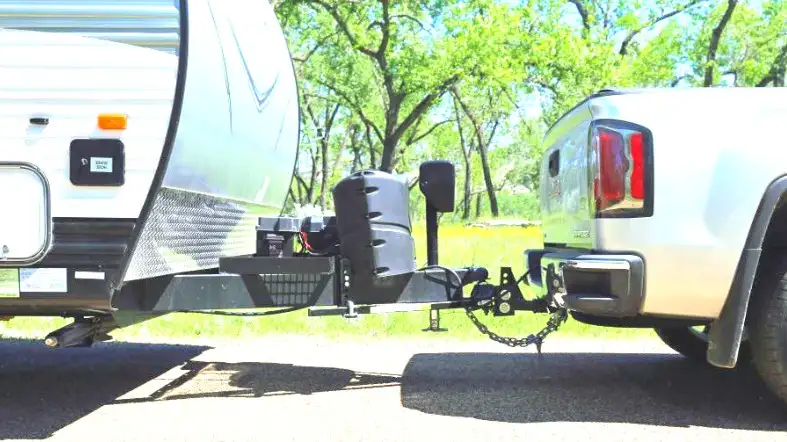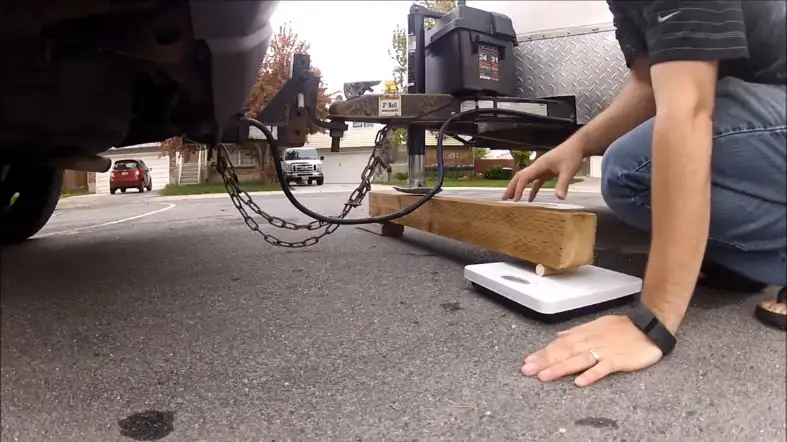We want to ensure the safety of our loved ones and ourselves when towing a travel trailer.
That’s why familiarizing yourself with its specific weights and weight constraints is crucial.
Clearly, you ought to know the whole mass of your recreational vehicle. But the hitch or tongue weight isn’t any less important.
So, the hitch weight vs tongue weight dispute is pretty crucial to be discussed.
In this piece of article, we will know about tongue weight, its significance, and the ways to measure it.
The difference: hitch weight vs tongue weight
“Hitch weight” is a word you could come across while learning about critical trailer weights and preparing your rig for safe travel.

In light of this, many individuals have begun to ask what the difference between hitch weight and tongue weight is as well as what exactly those terms entail.
The simple answer?
There is absolutely no difference!
Hitch weight is another name for tongue weight:
A bumper pull trailer’s entire pressure on a hitch is referred to as the hitch weight or tongue weight.
So, in theory, and practicality, there is no difference between these two terms.
Pin weight:
The phrase “pin weight” is often used interchangeably in place of the other two names: tongue weight/hitch weight.
So, individuals that are simply getting their feet wet in the trade may find things much more perplexing because of this.
However, though “pin weight” relates to the very same idea as the other two names, it is frequently applied in connection to 5th-wheel trailers in particular.
Simplify the terms:
Whatever the case may be, all three phrases, however, describe the same thing.
The downward pressure that the fifth wheel or trailer exerts on the towing vehicle’s hitch is the hitch weight/tongue weight/pin weight.
What exactly does “Tongue Weight” mean?

It’s conceivable that you’re thinking, “what exactly is tongue weight?
This is a really good question, and the answer to it will be the primary subject of the next paragraphs.
First off, it’s possible that the phrase “tongue weight” will seem ridiculous to you.
Really, who exactly is determining how much their tongue weighs?
The safe towing of your trailer is more concerned with this weight than it is with the tongue. That’s why it’s crucial that you learn as much as you can about it.
Tongue weight – as simple as it is – refers to the amount of downward pressure the trailer tongue exerts on towing vehicle’s hitch.
It is possible to modify this force. Modifying it frequently will help ensure that it remains within the ideal parameters.
What are the benefits of maintaining an ideal weight on your trailer?
Too much weight on the trailer’s tongue can make it difficult, if not impossible, to maneuver the towing vehicle.
On the other hand, swaying is a common problem for trailers that don’t put enough weight on the hitch of the towing car.
Calculate Tongue Weight:
This measurement may be obtained easily.
To achieve this, you may either use a tongue weight scale or a standard bathroom scale made for this purpose.
You also have to option to visit a commercial weighing station.
When determining tongue weight, deduct the unloaded weight of the tow vehicle from the total weight of the tow vehicle and trailer combination.
So, the equation is:
Tongue weight = (tow vehicle’s weight (with the trailer connected minus (–) the weight of the towing vehicle).
Tongue Weight Scale:
Start by packing your RV with your standard camping gear.
Then find a flat, hard place to park your car and trailer.
Now, use the tongue weight scale without raising the trailer’s height over its regular towing height.
Place the scale beneath the tongue jack.
Then keep lowering the jack as low as it takes to press on the scale.
Remove the trailer from the vehicle and check the weight without letting down the other jacks.
Your tongue weighs this much (the reading on the scale).
Seems really straightforward, doesn’t it?
Bathroom Scale measurement:
Although the procedure is more complex than we’d like, we’ll do our best to describe it.
Please be aware that this procedure is only suggested for trailers weighing 3,000 pounds or less.
To begin with, be certain that the trailer is completely loaded and resting on level ground.
Set a brick parallel to the trailer’s axle approximately a foot away from the coupler on the ground.
It will stand left to right in a perpendicular direction.
After moving the brick 2 yards away from the coupler, set down a bathroom scale on the tongue’s opposite side.
At the time of measuring, it is crucial to keep the scale and the brick at the same level.
Pipes should be positioned such that they point towards the same orientation as the trailer, one on the brick and the second on the bathroom scale.
After that, place a 3-and-a-half-foot long beam made of 4 x 4 lumber throughout the heads of the pipes.
Again, on the coupler’s longer beam, placing a 4 x4 shorter beam to the coupler may lower itself onto it.
Before taking measurements, make sure the scale is set to zero.
Then the tongue weight is calculated by lowering the trailer coupler.
The coupler shall rest on the shorter 4 x 4 before you take the reading.
Then, multiply the reading by 3. Why?
Because we have placed the brick and the scale three feet off from one another.
Market Weighing Station:

Here are the steps you must follow if you’d rather travel to a professional weighing facility.
Initiate the process by connecting the trailer’s hitch ball to the truck’s receiver.
Roll the vehicle onto the scale with all four tires.
The trailer must be left hooked but off the scale.
The next step is to remove the hitch from the trailer and check to confirm that there is no weight resting on the hitch.
Also, remove the trailer jack from the scale.
Perform another weigh-in on the truck, this time without the trailer attached.
Finally, to find out how much your tongue weighs, subtract that number from the first.
What is the Ideal Tongue Weight?
In most cases, we use a ball-mounted hitch.
The ideal weight for this type is hitch is an industry-standard one and approved by all the manufacturers.
Around 10 to 15 % of the gross towing weight of the trailer should be the tongue weight.
Take a trailer that weighs one thousand (2000) pounds, for instance.
The appropriate tongue weight would be anywhere between 200 to 300 pounds.
Let’s take a real-life example to understand this clearly.
Let’s say you are hauling 1000 pounds of goods in a trailer that weighs.
So, the total weight stands at 3000 + 1000 = 4000 pounds.
Now, reduce it down to 10-15 of this gross weight, which is 400-600 pounds.
The appropriate tongue weight should not go beyond this in any way.
Although the equation is pretty simple, there are some tricky situations to go through.
If you don’t know already, gooseneck and 5th-wheel trailers can easily carry substantially heavier loads than other types of trailers.
So, the appropriate tongue weight for these types of trailers is often agreed on high ground: 10-15%.
Check And Balance: Special Tips For Trailer Tongue Weight

Let’s learn more about controlling the tongue weight of your trailer to ensure the safety of your loved ones while traveling. Some of our top tips are as follows.
Maintain a regular tongue-weight check-up:
Some folks will always double-check before setting out.
Just because you don’t go quite that far, you should nevertheless double-check each time you make changes to the configuration of your cargo.
Purchase a high-quality scale for your needs:
We have discussed three types of hitches in this article.
Even if a bathroom scale may do the task, a tongue weight scale is the first priority.
It will make the measuring process a lot simpler.
Know your weight distribution hitch:
A weight distribution hitch must be able to support more than simply the weight of your tongue if you intend to use it.
Likewise, it must be sturdy enough to support whatever you toss behind the rear axle in the truck’s cargo area.
You’ll need to know your tongue weight while shopping for a hitch, so be sure to do so.
FAQs About hitch weight vs tongue weight
How Much Tongue Weight Can My Hitch Safely Support?
The ideal tongue weight for traditional trailers is somewhere in the range of 10 to 15 percent of the total loaded weight of the trailer.
What Do 500 Pounds Of Tongue Weight Mean?
A tongue weight of 500 pounds would imply a 5,000-pound trailer.
Is Hitch Weight Included In Dry Weight?
Dry weight is the gross weight of the vehicle.
Considering this, most professionals feel that a hitch/tongue weight of 10 to 15 percent of the trailer’s total weight is reasonable.
Does A Hitch Riser Reduce Tongue Weight?
According to experts, the utilization of a hitch riser results in a fifty percent reduction in the trailer hitch’s tongue weight capacity.
Does A Longer Ball Mount Increase Tongue Weight?
When it comes to tongue weight (TW), the ball mount’s size cannot affect it.
However, the size affects the pressure delivered to the receiver tube by the ball.
Final Words:
As the article simply presents you with, the hitch weight vs tongue weight dispute is nothing but confusion resulting from the two different names for the same thing.
However, whatever name you employ, the weight is way too significant for the safety of the driver, cargo, and vehicle itself.
So, follow our guide to ensure the utmost safety.
